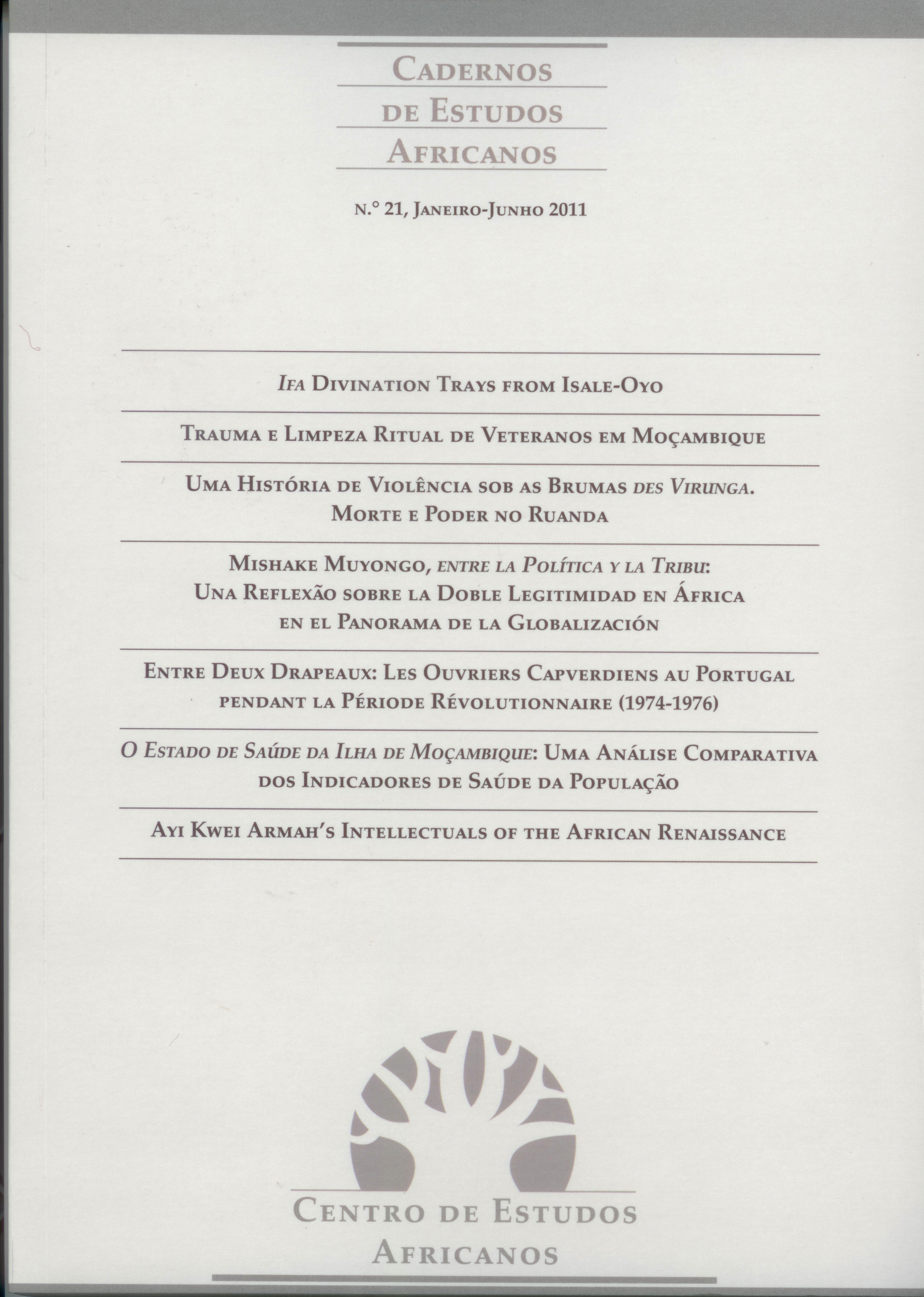Ayi Kwei Armah’s Intellectuals of the African Renaissance
DOI:
https://doi.org/10.4000/cea.233Palavras-chave:
educational system, Western education, social transformation, African intellectualsResumo
Ayi Kwei Armah is a living Ghanaian novelist and cultural activist. His life and body of novelistic experiments show a meticulous preoccupation with Africa’s present cultural crisis. His seven novels to date, in addition to his autobiography entitled The Eloquence of the Scribes (2006), all illustrate a relentless intellectual campaign for articulating the ways in which the ”right” and committed intellectuals can be singled out from what he takes as multitudes of pseudo- or parvenu academics. For Armah, a carefully devised and administered educational system should form the basis for a reformed African ethos. This article explores Armah’s call for renovating the present educational philosophy that aims to promote a new idea of Africa. Constructing an authentic educational system is justified by him through the need to supersede the devastating effects imposed by and instituted through colonial education. Below is an attempt to debate Armah’s deconstructive approach of the colonial educational pattern. Similarly, viable prospects of a change of perspective are reviewed. In founding schools throughout Africa and granting scholarships in metropolitan universities to African students, Armah thinks, colonial powers only meant to maintain control, even after the end of their direct occupation.Referências
Abraham, W. (1962). The mind of Africa. Chicago, IL: University of Chicago Press.
Adekoya, O. (2006). Psychopaths in power: The collapse of the African dream in A play of giants. In: Beckman, B. & Adeoti, G. (Eds.), Intellectuals and African development. Dakar: CODESRIA.
Armah, A. K. (1968). The beautyful ones are not yet born. London: Heinemann Educational Books.
Armah, A. K. (1970). Fragments. London: Heinemann Educational Books.
Armah, A. K. (1972). Why are we so blest? London: Heinemann Educational Books.
Armah, A. K. (1973). Two thousand seasons. London: Heinemann Educational Books.
Armah, A. K. (1978). The healers. London: Heinemann Educational Books.
Armah, A. K. (1990). Our awakening. Video Lecture at Berkeley University. Retrieved from http://www.youtube.com/watch?v=0wrTdqlBHK&feature-related.
Armah, A. K. (1995). Osiris rising. Popenguine, Senegal: Per Ankh Publishing Co-operative.
Armah, A. K. (2002). KMT: In the house of life. Popenguine, Senegal: Per Ankh Publishing Cooperative.
Armah, A. K. (2006). The eloquence of the scribes. Popenguine, Senegal: Per Ankh Publishing Cooperative.
Ayivor, K. (2003). “The beautyful ones were born and murdered”: Armah’s visionary reconstruction of African history and the Pan-Africanist dream in Osiris rising. The Journal of Commonwealth Literature, 38 (3), 37-69.
DOI : 10.1177/00219894030383004
Berger, P. L., & Luckmann, T. (1991). The social construction of reality. Harmondsworth: Penguin (Original work published 1966).
Blyden, E. W. (1994). Christianity, Islam and the Negro race. Baltimore: Black Classic Press (Original work published 1888).
Bourdieu, P. (1997). State nobility. Trans. Lauretta C. Clough. Cambridge: Polity Press.
Diop, Ch. A. (1974). The African origin of civilization: Myth or reality. Trans. Mercer Cook. Chicago: Laurence Hill Books.
Fanon, F. (1967). The wretched of the earth. Trans. Constance Farrington. Harmondsworth: Penguin (Original work published 1961).
Gramsci, A. (1971). Selections from the prison notebooks. Trans. Quintin Hoare & Geoffrey Nowell Smith. New York: International Publishers.
Smith, R. D. (1998). Social structure and social theory. Sociological Research Online, 3 (1). Retrieved from http://www.socresonline.org.uk/socresonline/3/1/11.html
Spencer, N. A. (1985). Political consciousness and commitment in modern African literature: A study of the novels of Ayi Kwei Armah. Ph.D. Thesis, State University of New York at Stony Brook.
Suttner, R. (2005). The character and formation of intellectuals within the ANC-led South African Liberation Movement. In Mkandawire, T. (Ed.), African Intellectuals: Rethinking politics, language, gender and development (pp. 117-154). Dakar and London: CODESRIA and Zed Books.
Wacquant, L. (1997). Forward. In Bourdieu, P., The state nobility (pp. x-xiii). Cambridge: Polity Press.
Downloads
Publicado
Edição
Secção
Licença
Direitos de Autor (c) 2016 Cadernos de Estudos Africanos

Este trabalho encontra-se publicado com a Licença Internacional Creative Commons Atribuição-NãoComercial-CompartilhaIgual 4.0.
Autorizo a publicação do artigo/recensão submetido do qual sou autor.
Declaro ainda que o presente artigo é original, que não foi objecto de qualquer tipo de publicação, e cedo em exclusivo os direitos de publicação à revista Cadernos de Estudos Africanos. A reprodução do artigo, no todo ou em parte, noutras publicações ou noutros suportes depende de autorização prévia da editora Centro de Estudos Internacionais do Iscte - Instituto Universitário de Lisboa.

